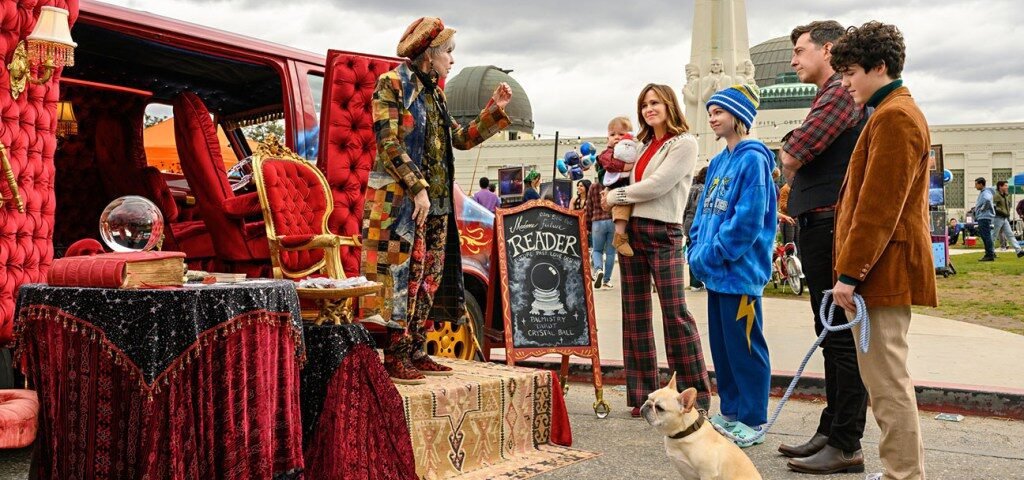


NASA’s Educational CubeSats: Small Satellites, Big Impact
December 1, 2023


NASA Delivers Inclusion Message to Annual Bayou Classic Participants
December 1, 2023Garner and Ed Helms play parents who switch bodies with their teen children right before Christmas in the McG-directed movie.
Family Switch
Innocuously sweet and entirely forgettable.
The most ideal movie to watch with family over the holidays is one everyone can love — one broadly compelling enough to convince everyone from disaffected tweens to grumpy grandparents to set aside their drama and come together in mutual awe. Barring that, the second most ideal movie to watch with family might just be one no one can truly hate. That’s where Netflix’s Family Switch resides.
At the center of the McG-directed film are the Walkers, a brood of upper-middle-class overachievers. Mom Jess (Jennifer Garner) is a hotshot architect on the verge of making partner at her big firm. Dad Bill (Ed Helms) is a rock musician turned cool band teacher. Seventeen-year-old CC (Emma Myers) is such a gifted soccer player that she’s got the U.S. national team in her sights, and Wyatt (Brady Noon) is such a STEM whiz that he’s applying for early acceptance to Yale as a ninth-grader.
It should be an appealingly high-stakes premise, but Family Switch makes its anodyne sensibility clear long before any of the mystical stuff even occurs. In the first minutes of the movie, Bill snags part of a candy-cane costume on a Christmas tree, slips on the puddle of dog urine under his feet and takes the whole tree down with him as he topples. Despite Helms’ committed physicality, there’s a rote quality to the entire pratfall. It feels less like a real joke than the outline of one. But it’s just good enough to warrant a small smile — maybe more for easily amused children or adults who just really enjoy watching Ed Helms fall on his face. In any case, the film moves on before the gag can wear out its welcome.
Once the characters do swap bodies, the fun of seeing them trade places is somewhat undermined by a script (by Victoria Strouse and Adam Sztykiel) that gives none of them a distinctive personality in the first place. The younger leads at least have the advantage of aping performers we’re familiar with already, and Myers in particular nails Garner’s supermom vibe. By contrast, Garner and Helms are game for anything — including belching, farting and retching — but all their enthusiastic mugging can’t mask the fact that CC and Wyatt aren’t much more than a stereotypical surly teen and a stereotypical geek.
Only twice did I actually laugh out loud during the 100-minute movie: once during a 13 Going on 30 reference that provided a welcome glint of self-awareness from a film that otherwise demonstrates no interest in trying anything new with the formula it’s following; and once during an argument about freeways that registered as the most authentically Angeleno moment in a story that involves multiple trips to the Griffith Observatory.
It’s probably not much surprise, then, that Family Switch‘s emotional side doesn’t hit very hard either. Occasionally the script hints ever so gingerly at deeper hurts. Jess’ concern about CC’s soccer aspirations is revealed to stem from her own thwarted athletic career, and Bill is rumored by his students to have given up the opportunity to be a part of Green Day, or Black Sabbath, or some other “band about a color,” to raise his family. A braver movie might have dug further into the parents’ ambivalence about what they’ve given up. But this one is practically allergic to conflict and difficulty, and so it brushes past these insights in favor of reassuring clichés about the rewards and joys of parenthood.
Paradoxically, this insistent niceness makes Family Switch less heartwarming than it seems like it should be. It’s simply hard to feel all that deeply for characters so flat and sweet they might as well be gingerbread people, resolving problems that barely seemed to exist in the first place. But it also makes the film completely and utterly safe as background filler. There’s nothing here that risks bringing up difficult or painful conversations, or steering toward an unhappy ending, or pressuring viewers to pick sides while you’re just trying to curl that last bit of ribbon or untangle that last string of lights. And once you don’t need it anymore, there’s nothing here that risks lingering in your memory for better or for worse, either.





